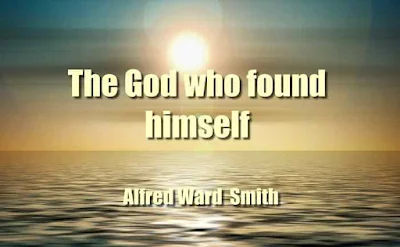The God who found himself
the god of science and the illusion of self: an interpretation of the philosophy, religion, and ethics of a rational and scientific monism
From introduction
The Spirit of the universe is eternally striving to realize and find itself in the world and man. Self-realization, self-discovery and striving are the law of God's life just as certainly as it is of man's. In fact, it is the law of man's partial and earthly life, only because it is originally the law of God's whole and universal existence. It is man's duty to strive and realize himself, only because it is primarily the law of God's whole universe to strive and realize itself.
The law of cosmic evolution, in truth, is nothing but the law of the striving towards self-realization of the universal Being or God of the world. Evolution is the fact and principle of God's endless seeking and striving towards self-development, self-discovery, self-realization and self-perfection. Evolution signifies the self-realization of God, and hence it is a law of self-realization to man because he is, in truth, but apart, — organ and function of the divine whole.
The Spirit of the universe is always seeking- ing to find itself, and always striving to realize itself in the life of man. But man, who is a product of the evolutionary process, grows Intelligent and enlightened only by slow degrees.
He is primitively but an intellectual and spiritual child, and grows to mental maturity and spiritual manhood only by steps and stages. He is at first the inevitable victim of ignorance, stupidity, and fear; of mental immaturity and spiritual childishness. He has easily led astray into false and plausible pathways that lead him away from his true self and true God, and lure him on to the belief in a false self and in false and futile gods. He thus becomes the inevitable and innocent dupe of illusions and superstitions at a certain early stage of his mental and spiritual career, and it is as appropriate to this period of man's mental and religious life that the following parable of the Swami Vivekananda applies. " If the king goes mad," he says, " and goes about to find the king in his own country, he will never find him, because he is the King himself. It is better that we know we are the king, and give up this fool's search after the king."
This parable of the Hindu monk and philosopher gives the keynote to the following discussion. Its meaning is perfectly simple and plain, and, briefly interpreted, it would read like this: If the God of the world, — or, as Monism claims, the one and only real and complete Being of the world, — is blind and ignorant in its human form of its own very self-hood, and goes groping to find some other being than itself as a whole, it will never find it, because this other and second being is unreal, and exists only in its own be- clouded mind and immature imagination.
It is better, therefore, that this one and only real Being shall know, in its human form, that it is God, and give up this foolish and futile search after an imaginary God outside and beyond itself, as a universal and organic whole.
Contents:
Introduction i
I The World op Illusion .... 1
II The Evolution of the Many out of
THE One 31
III The Unifying Tendency of Science. 36
IV The Unifying Tendency of Philosophy 47
V The Dynamic and Diffusive Character of all Being 55
VI The Evolution of Social Bodies . . 61
VII The Evolution of Social Minds . . 72
VIII The Dynamic Nature of the Mind. 88
IX The Illusion of Memory .... 101
X The Cosmic Ego 112
XI The Social Ego 115
XII The Ethics of Monism 145
XIII The God who Finds himself . . .157
XIV The God who Realizes and Perfects
himself 170
I The World op Illusion .... 1
II The Evolution of the Many out of
THE One 31
III The Unifying Tendency of Science. 36
IV The Unifying Tendency of Philosophy 47
V The Dynamic and Diffusive Character of all Being 55
VI The Evolution of Social Bodies . . 61
VII The Evolution of Social Minds . . 72
VIII The Dynamic Nature of the Mind. 88
IX The Illusion of Memory .... 101
X The Cosmic Ego 112
XI The Social Ego 115
XII The Ethics of Monism 145
XIII The God who Finds himself . . .157
XIV The God who Realizes and Perfects
himself 170
Download The God who found himself -3.8 MB


